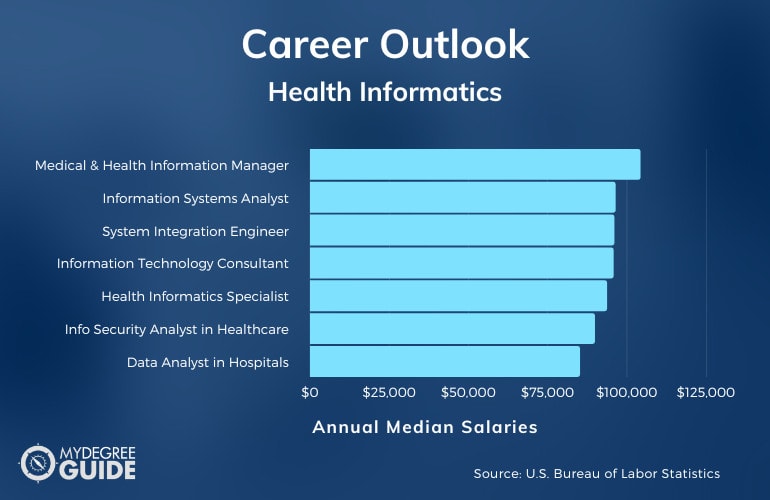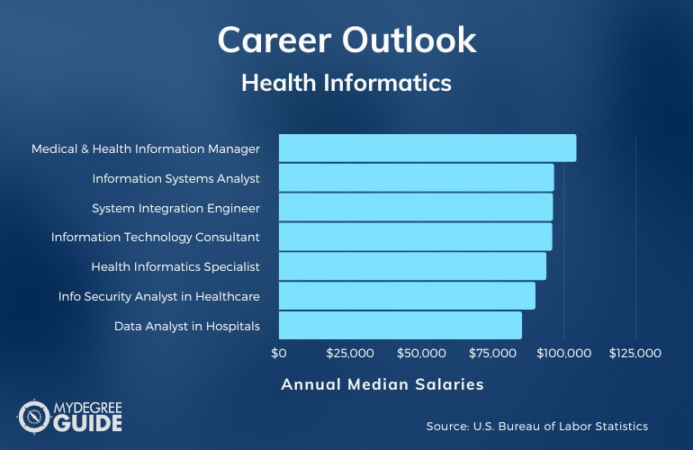
Introduction
Health informatics is the field that combines healthcare and information technology to improve patient outcomes. It involves the use of data, technology, and knowledge to deliver better healthcare.
Pursuing a master’s degree in health informatics can provide you with the skills and knowledge you need to work in this growing field. You will learn how to use data to improve patient care, how to develop and implement new health information systems, and how to manage the ethical and legal issues that arise in the use of health information.
Curriculum
A Master’s program in Health Informatics typically consists of a structured curriculum designed to equip students with the knowledge and skills necessary for a successful career in the field. The program usually comprises core coursework, elective courses, and a capstone project or thesis.
Core coursework covers foundational concepts in health informatics, including data management, analytics, information systems, and healthcare technology. Students gain a comprehensive understanding of the principles and practices involved in managing, analyzing, and utilizing health data to improve patient care and healthcare delivery.
Specialized Tracks or Concentrations
Many programs offer specialized tracks or concentrations within the Health Informatics Master’s degree. These tracks allow students to focus on specific areas of interest, such as:
- Clinical Informatics: Focuses on the use of informatics in clinical settings, including electronic health records, clinical decision support systems, and telehealth.
- Public Health Informatics: Prepares students for careers in public health agencies, where they use informatics to improve population health, disease surveillance, and health policy.
- Bioinformatics: Combines informatics with biology to analyze large-scale biological data, such as genomic and proteomic data.
- Health Data Analytics: Emphasizes the use of data analytics techniques to extract insights from health data, support evidence-based decision-making, and improve healthcare outcomes.
Admissions Requirements
Pursuing a Master’s degree in Health Informatics typically requires meeting specific admission criteria to ensure candidates possess the necessary knowledge and skills for the program.
Common requirements include:
Prerequisites
- A Bachelor’s degree in a related field, such as health sciences, computer science, or information technology.
- Coursework in statistics, programming, and database management.
GPA Expectations
Most programs require a minimum undergraduate GPA, typically ranging from 3.0 to 3.5 on a 4.0 scale.
Additional Qualifications and Experience
Some programs may consider additional factors, such as:
- Relevant work experience in healthcare or informatics.
- Certifications in health informatics or related fields.
- Research experience or publications.
Application Deadlines and Processes
Application deadlines vary by program, but typically fall between December and February for fall admission and July and August for spring admission.
The application process usually involves submitting an online application, official transcripts, letters of recommendation, and a statement of purpose.
Program Comparison
When evaluating different health informatics master’s programs, it’s crucial to consider several key factors to make an informed decision. These factors include:
Tuition and Fees
- Consider the total cost of the program, including tuition, fees, and any additional expenses.
- Explore scholarship and financial aid opportunities to offset the financial burden.
Program Length
- Determine the duration of the program, whether it’s a full-time or part-time option.
- Consider how the program’s length aligns with your personal and professional goals.
Course Offerings
- Review the curriculum of each program to ensure it covers the core areas of health informatics.
- Explore specialized courses that align with your interests and career aspirations.
Faculty Expertise
- Research the faculty members involved in the program, their research interests, and industry experience.
- Consider the opportunities for mentorship and collaboration with faculty experts.
Program Features
Health informatics master’s programs offer a range of unique features and strengths that cater to the diverse needs of students.
These programs often have strong research components, providing students with opportunities to participate in cutting-edge research projects. They also frequently collaborate with industry partners, giving students access to real-world experience and potential job opportunities.
Research Opportunities
Many health informatics master’s programs offer research opportunities for students to work on projects related to their interests. These projects can be conducted in collaboration with faculty members, industry partners, or healthcare organizations.
- For example, the University of Washington’s Master of Science in Health Informatics program offers a research track that allows students to work on a research project with a faculty mentor.
- The University of California, Berkeley’s Master of Information and Data Science program offers a specialization in health informatics that includes research opportunities in areas such as machine learning and artificial intelligence in healthcare.
Industry Partnerships
Health informatics master’s programs often have partnerships with industry leaders, such as hospitals, health insurance companies, and technology companies.
- These partnerships provide students with opportunities for internships, guest lectures, and research collaborations.
- For example, the University of Texas Health Science Center at Houston’s Master of Science in Health Informatics program has partnerships with organizations such as the Texas Medical Center, the University of Texas MD Anderson Cancer Center, and the Houston Methodist Hospital.
Specialized Certifications
Some health informatics master’s programs offer specialized certifications in areas such as health information management, health data analytics, and clinical informatics.
- These certifications can provide students with an additional competitive edge in the job market.
- For example, the University of Pittsburgh’s Master of Science in Health Informatics program offers a certification in health information management from the American Health Information Management Association (AHIMA).
Student Projects and Capstone Experiences
Health informatics master’s programs typically require students to complete a capstone project or thesis as part of their degree requirements.
- These projects allow students to apply their knowledge and skills to real-world problems.
- For example, students in the University of Illinois at Chicago’s Master of Science in Health Informatics program complete a capstone project that involves working with a healthcare organization to develop a health information system or solve a specific health informatics problem.
Online vs. On-Campus Programs
Choosing between an online and on-campus health informatics master’s program depends on individual preferences, career goals, and circumstances. Each format offers unique advantages and considerations.
Factors to Consider
Consider factors such as:
– Flexibility: Online programs offer flexibility in scheduling and location, allowing students to balance work, family, and studies.
– Social Interaction: On-campus programs provide opportunities for face-to-face interactions with faculty and peers, fostering a sense of community.
– Technology Requirements: Online programs require reliable internet access and proficiency in using online learning platforms.
– Career Goals: Some employers may prefer candidates with on-campus experience, while others may value the flexibility and convenience of online programs.
Advantages of Online Programs
– Flexibility: Allows students to learn at their own pace and schedule, often from anywhere with an internet connection.
– Reduced Costs: May offer lower tuition and fees compared to on-campus programs, as students avoid commuting and housing expenses.
– Global Reach: Connects students with faculty and peers from diverse backgrounds, expanding networking opportunities.
Advantages of On-Campus Programs
– Structured Learning Environment: Provides a dedicated and immersive learning environment, promoting focused study and interaction.
– Hands-on Experience: Often includes access to on-site laboratories and facilities, providing practical training opportunities.
– Networking Opportunities: Encourages in-person connections with faculty, peers, and potential employers.
Examples of Successful Programs
Online Programs:
– University of Washington’s Master of Science in Health Informatics and Data Science
– University of Illinois at Chicago’s Master of Science in Health Informatics
On-Campus Programs:
– Johns Hopkins University’s Master of Science in Health Informatics
– Columbia University’s Master of Science in Biomedical Informatics
Conclusion

In conclusion, pursuing a master’s degree in health informatics provides numerous benefits for individuals seeking to advance their careers in the healthcare industry. This degree equips graduates with the knowledge, skills, and expertise to effectively manage, analyze, and utilize health data to improve patient care, enhance healthcare operations, and drive innovation in the field.
The curriculum covers essential topics such as health information systems, data analytics, project management, and ethical considerations. By completing this program, graduates can qualify for a wide range of high-paying and in-demand roles within healthcare organizations.
If you are considering pursuing a master’s degree in health informatics, the next step is to research different programs, compare their curriculum and faculty, and determine which one best aligns with your career goals. With the right program and dedication, you can gain the skills and knowledge necessary to succeed in this dynamic and rewarding field.





